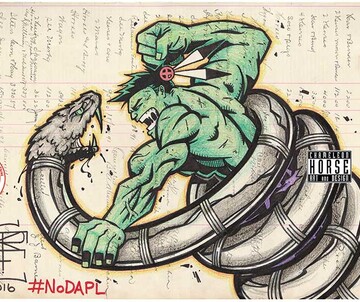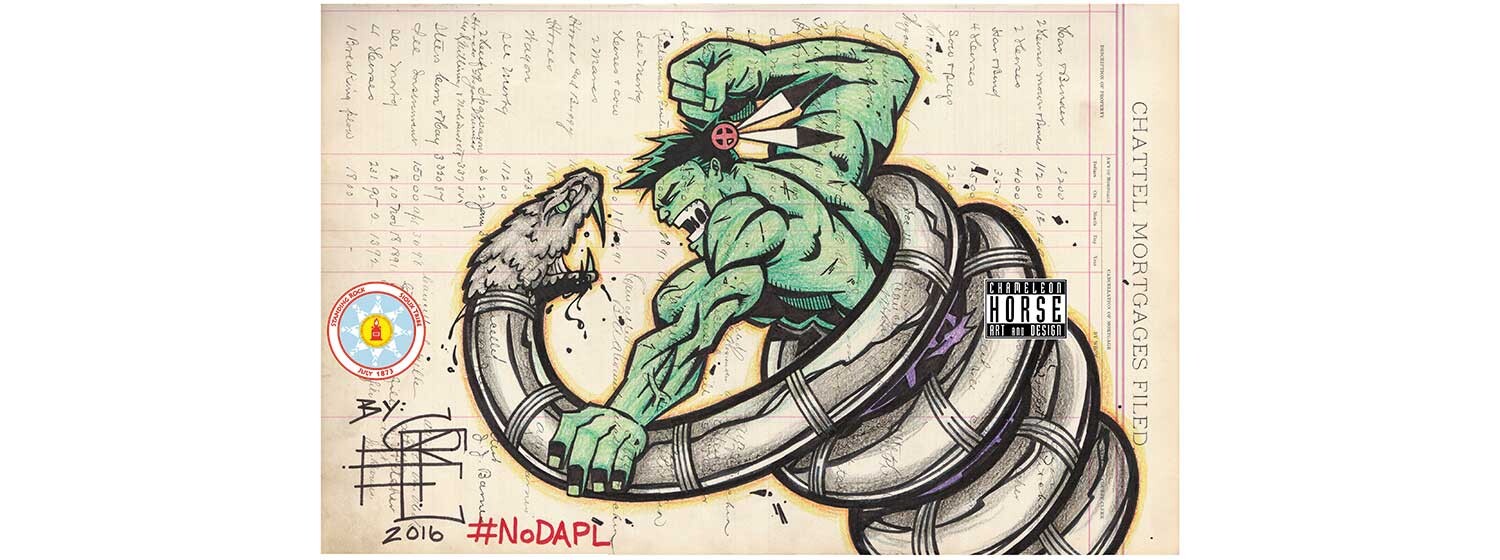25.08.2021 to 21.11.2021
Host: MQ Cultural Tenants
Supporting program to the exhibition "Overground Resistance"
FREE ENTRY, EDUCATION, LITERATURE & DISCOURSE, ART, FILM & DIGITAL CULTURE


All events are free of charge.
The current access regulations apply.
Curator's Guided Tours
Vienna Art Week: Fri, 12.11., 2pm - Dialogue Tour with Oliver Ressler and T. J. Demos
ORF Long Night of Museums: Sat, 02.10., 8pm & 9pm
Fri, 10.09., 1pm
Header Image: Gilbert Kills Pretty Enemy III, #NoDAPL, poster, 2016
Thursday Talks:
Vanina Saracino: Seeing through flames – Intersectional resistance toward (climate) justice
Do 18.11., 18.30h
‘Seeing through flames’ virtually brings together artistic practices that explicitly engage in political resistance from an intersectional standpoint, challenging the dominant narratives through acts of indigenous counter-mapping, guerrilla reindeer herding, and dissident drag folk dance for decolonial empowerment. Departing from an understanding of climate change as a form of violence, these artists highlight how different aspects of discrimination must be taken into account when organizing collective action. But they also open questions on art’s potential to transform our modes of seeing and making sense of the world, and to translate this shift into lasting social change.
Vanina Saracino is an independent curator, writer and lecturer. Her work focuses on theories and art strategies that explicitly question anthropocentric and binary worldviews from an intersectional perspective, with an emphasis on lens-based and time-based art practices. She is currently co-curating the upcoming Screen City Biennial Other Minds (Oslo and Berlin, 2022) and teaching the seminar ‘More-than-human perspectives and tentacular thinking’ at the Universität der Künste (Berlin).
As part of the VIENNA ART WEEK 2021.
T. J. Demos: The Aesthetics and Politics of Climate Justice
Do 11.11., 18.30h
In this informal talk, T. J. Demos will discuss the compelling aesthetic and political approaches and challenges in addressing climate justice. Going beyond conventional understandings of climate emergency, artists and activists—including those in this very exhibition, “Overground Resistance”—are joining the socio-political to the ecological to best address the ongoing world-historical crisis that is at once a crisis of carbon pollution and a disaster of racial and colonial capitalism.
T. J. Demos is an award-winning writer on contemporary art and global politics. He is Professor in the Department of the History of Art and Visual Culture, at University of California, Santa Cruz, and founding Director of its Center for Creative Ecologies. He researches the intersection of visual culture, radical politics, and political ecology, and is the author of numerous books, including Beyond the World’s End: Arts of Living at the Crossing (Duke, 2020); Decolonizing Nature: Contemporary Art and Political Ecology (Sternberg, 2016); and Against the Anthropocene: Visual Culture and Environment Today, (Sternberg, 2017). He recently co-edited The Routledge Companion on Contemporary Art, Visual Culture, and Climate Change (2021), was a Getty Research Institute Fellow (Spring 2020), and directed the Mellon-funded Sawyer Seminar research project Beyond the End of the World (2019-21). Demos is also Chair and Chief Curator of the Climate Collective, providing public programming related to the 2021 Climate Emergency > Emergence program at the Museum of Art, Architecture and Technology (Maat) in Lisbon. He is presently working on a new book on radical futurisms.
Amanda Masha Caminals: New narratives for a non-dystopic ecological transition
Do 14.10., 18.30h
Climate justice movements have long contributed significantly to efforts to identify and make visible the global threat posed by the environmental crisis. Acts of “overground resistance” on a massive scale have directed attention to narratives unlike those global geopolitical elites and mass media: climate “crisis” and imminent collapse as opposed to mild climate “change”; deceleration and a process of retreat as opposed to “sustainable development”.
But what are the terms of the ecological transition that we must undertake now? How might such movements act both as resistance apparatuses and propositional devices? Today, more than ever, we need initiatives that help us foster our collective imagination with the possibility of non-dystopic futures, of affective political strategies weaving resilient communities. What role can art play in this? What imaginaries can it activate?
Amanda Masha Caminals is co-director and curator of the Mutant Institute of Environmental Narratives (IMNA), the artistic laboratory for climate of Matadero Madrid. Previously she directed the CITY STATION of the Environmental Health Clinic by artist Natalie Jeremijenko at the Centre for Contemporary Culture of Barcelona (CCCB). She founded the organization Translocalia, a network of artists, curators and designers to plan for the future through art, and is an advisor to the STARTS Prize program run by the European Commission. She has worked in institutions including the Institute of International Visual Arts in London and Casa Triângulo in São Paulo. She holds a BA in Humanities from Pompeu Fabra University in Barcelona, a degree in History of Art from the University of Barcelona and an MA Hons in Curating Contemporary Art from the Royal College of Art in London.
A4C - ArtsForTheCommons: Visualizing complexities of the living. Countermapping Mother Earth’s rights
Do 23.09., 18.30h
The presentation will focus on ongoing research on rights of nature and urban resistance based on works and videos shot in various locations (Ecuador, South Korea and Italy) and on “Vilcabamba – de Iura fluminis et Terrae”, which will appear in the 2022 Sydney Biennale. Project partners are the Global Alliance on the Rights of Nature, the International Tribunal on the Rights of Nature and a collective of Australian aboriginal artist and academics. It will consist of a video and a music piece created using GPS data from rivers with legal personhood. Other works to be presented will deal with hacking smart cities, resisting extractivism and reclaiming the rights of urban ecosystems.
A4C – Artsforthecommons, a collective platform founded by Ecuadorian visual artist Rosa Jijon and Italian activist Francesco Martone, started working on migration and borders with exhibitions in Ecuador, Italy and Slovenia, and a publication on migration and contemporary arts. Current areas of work include extractivism, rights of nature and urban commons.
Marco Baravalle: Alter-instituent practices in a neoliberal art world
Do 09.09., 18.30h
As a tragic but coherent result of extractivism – a predatory attitude towards natural resources and the web of life – the COVID19 pandemic is both a consequence and a blockage of the globalized neoliberal economy. Like many other sectors, the arts have been hit, blocked and slowed down. The impact of the pandemic has highlighted limits and inadequacies of our neoliberal art world: a system where the epistemic capture of radical themes, claims, theories and images seems to guarantee the reproduction of a structure solidly anchored to capitalistic priorities, rather than opening spaces of social transformation. Although no easy solution is in sight, it is still possible to focus on some crucial points to orient ourselves and to act in the present situation: the potentiality of alter-instituent practices; the transformation of the art mobility regime from neoliberal nomadism to radical permanence; the discovery of a decolonised dialectics in place of the paternalistic aesthetics of dialogue; the deconstruction of the link between art and rent in favor of institutional models of care, and much more.
Marco Baravalle is a member of S.a.L.E. Docks, a collective and an independent space for visual arts, activism and experimental theater, founded in 2007 and located in what was previously an abandoned salt storage facility in Dorsoduro, Venice, Italy. The programming of S.a.L.E. Docks includes activist group meetings, formal exhibitions and screenings.
Baravalle is a research fellow at INCOMMON. In praise of community. Shared creativity in arts and politics in Italy (1959-1979), a project hosted by IUAV, University of Venice.
He teaches Phenomenology of Contemporary Art in the MA in Visual Arts and Curatorial Studies program at NABA (Nuova Accademia di Belle Arti, Milan).
He is a member of IRI (Institute Of Radical Imagination), a collective inviting political scientists, economists, lawyers, architects, hackers, activists, artists and cultural producers to share knowledge on a continuous basis with the aim of defining and implementing zones of post-capitalism in Europe’s South and the Mediterranean.